小学英语六年级上册回答问题归纳
六年级上册英语语法问题集

六年级上册英语语法问题集1. 一般现在时- Q: 一般现在时的基本结构是什么?- A: 一般现在时的基本结构是主语 + 动词原形。
- Q: 一般现在时的用法有哪些?- A: 一般现在时用于表示经常性的动作、习惯性的行为、客观事实等。
- Q: 如何构成一般现在时的否定句和疑问句?- A:- 否定句:在动词前加助动词“do not”或“does not”。
- 疑问句:将助动词“do”或“does”置于主语之前。
2. 一般过去时- Q: 一般过去时的基本结构是什么?- A: 一般过去时的基本结构是主语 + 动词过去式。
- Q: 一般过去时的用法有哪些?- A: 一般过去时用于表示过去发生的动作或状态。
- Q: 如何构成一般过去时的否定句和疑问句?- A:- 否定句:在动词前加助动词“did not”。
- 疑问句:将助动词“did”置于主语之前。
3. 现在进行时- Q: 现在进行时的基本结构是什么?- A: 现在进行时的基本结构是主语+ am/is/are + 动词-ing形式。
- Q: 现在进行时的用法有哪些?- A: 现在进行时用于表示此刻正在进行的动作。
- Q: 如何构成现在进行时的否定句和疑问句?- A:- 否定句:在助动词“am/is/are”后加“not”。
- 疑问句:将助动词“am/is/are”置于主语之前。
4. 一般将来时- Q: 一般将来时的基本结构是什么?- A: 一般将来时的基本结构是主语 + will + 动词原形。
- Q: 一般将来时的用法有哪些?- A: 一般将来时用于表示将来要发生的动作或事件。
- Q: 如何构成一般将来时的否定句和疑问句?- A:- 否定句:在助动词“will”后加“not”。
- 疑问句:将助动词“will”置于主语之前。
5. 现在完成时- Q: 现在完成时的基本结构是什么?- A: 现在完成时的基本结构是主语 + have/has + 过去分词。
- Q: 现在完成时的用法有哪些?- A: 现在完成时用于表示过去发生的动作对现在产生的影响或结果。
人教版小学pep英语三年级起点六年级上册口语表达归纳
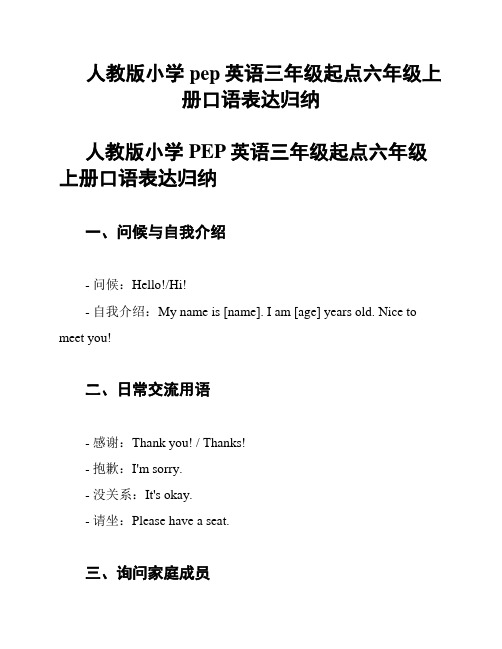
人教版小学pep英语三年级起点六年级上册口语表达归纳人教版小学PEP英语三年级起点六年级上册口语表达归纳一、问候与自我介绍- 问候:Hello!/Hi!- 自我介绍:My name is [name]. I am [age] years old. Nice to meet you!二、日常交流用语- 感谢:Thank you! / Thanks!- 抱歉:I'm sorry.- 没关系:It's okay.- 请坐:Please have a seat.三、询问家庭成员- 询问他人的家庭成员:Do you have any brothers or sisters? / How many brothers or sisters do you have?- 回答关于家庭成员的问题:I have [number] brothers/sisters.四、问日期、时间和天气- 问日期:What's the date today?- 问时间:What time is it?- 问天气:What's the weather like today?五、询问和描述喜欢的事物- 询问他人喜欢的事物:What's your favorite [food/color/animal]?- 描述自己喜欢的事物:My favorite [food/color/animal] is...六、询问和描述外貌特征- 询问他人的外貌特征:What does he/she look like?- 描述他人的外貌特征:He/She has [hair color/eye color/height].- 描述自己的外貌特征:I have [hair color/eye color/height].以上是对人教版小学PEP英语三年级起点六年级上册口语表达的归纳总结。
希望对你有所帮助!。
最新人教版PEP英语六年级上册知识点归纳
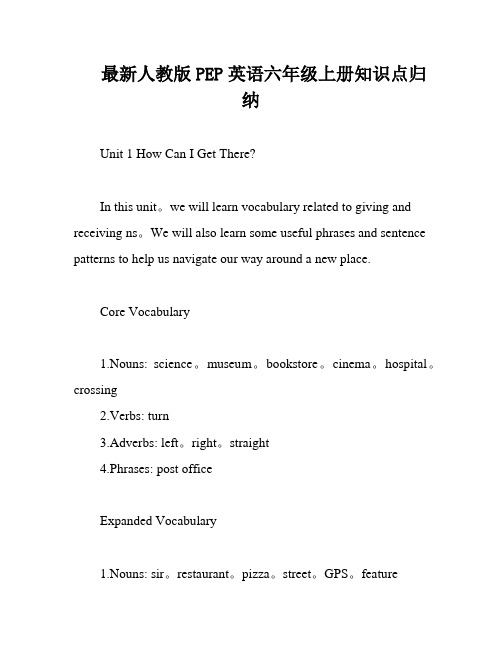
最新人教版PEP英语六年级上册知识点归纳Unit 1 How Can I Get There?In this unit。
we will learn vocabulary related to giving and receiving ns。
We will also learn some useful phrases and sentence patterns to help us navigate our way around a new place.Core Vocabulary1.Nouns: science。
museum。
bookstore。
cinema。
hospital。
crossing2.Verbs: turn3.Adverbs: left。
right。
straight4.Phrases: post officeExpanded Vocabulary1.Nouns: sir。
restaurant。
pizza。
street。
GPS。
feature2.Verbs: ask。
get。
gave。
follow。
tell3.Adjectives: interesting。
Italian。
farSentence Patterns1."Where is the ____?" - "It's next to the ____."2."How can we get there?"3."Turn left/right at the _____。
Then turn left/right at the _____."Note: Be mindful of ns and their fixed phrases.Useful Phrases1."Is there a ____?"2."There is a ____ under the ____."3."There be" sentence pattern - "There is/are ____." (Remember the principle of proximity.)By learning and practicing these vocabulary words。
苏教版译林小学英语六年级上册6A总复习按实际情况回答问题

6A 总复习一、按实际情况回答问题1.What day is it today?2.What’s in your right hand?3.What are you doing now?4.Where are you now?5.Where were you last Sunday?6.Were you in the classroom yesterday?7.What day was it yesterday?8.What did you do last Monday?9.What did your mother do last night?10.What did your parents do on Wednesday?11.What do you do on Saturdays?12.What does your father usually do after supper?13.Did you visit the zoo last weekend?14.Did your family visit your grandparents last weekend?15.What time did you go to school this morning?16.Could you read books ten years ago?17.How many people are there in your family?18.What’s in your bedroom?19.Is your hair long?20.Are your eyes big?21.Are you playing football now?22.Does your father like reading?23.What’s your hobby?24.What’s your father’s hobby?25.What does your mother do every day ?26.How do you spend your weekends?27.How does your friend spend his weekends?28.Where are you from?29.Where is your Chinese teacher from?30.Do you speak French?31.Does your mother speak English?32.What are you going to do at Chinese New Year?33.How was the weather yesterday?34.Where did you go for your holiday?35.What is your mother going to do tomorrow?36.Are you going to watch TV next weekend?37.How can we reuse old newspapers?38.What can you do to keep the city clean?39.Is your father going to cook tomorrow evening?40.How to protect our Earth?41.What makes the river dirty?42.Where can we put the sign” No smoking” ?43.How was your summer holiday?44.What couldn’t your father do twenty years ago?45.Where was your mother last Monday?46.How much are your jeans?47.How many subjects do you have this term?48.When did you go to bed last night?49.To protect the Earth ,what shouldn’t we do ?50.What places are you going to visit next Sunday?二、用所给词或字母的适当形式填空1. My father starts_______(make) a plastic toy.2. My sister ___________(be) a nurse next month.3. Her aunt ___________ (give) a card to her yesterday.4.There ___________(be) any fish on the plate.5. They___________(talk) about Chinese New Year now.6. Do you want________(learn) French?7. Mike _________(get) a letter from his friend two days ago.8. Would you like____________ (watch) a film?9. Today is the___________(three) of May.10. There is a school bag on__________(Nancy) desk.11.Jim often__________(fly) kites at weekends.12.The teachers are in front of __________(we).13.Bobby often __________(walk) to school.14.What can we do ___________(keep) our city clean?15.People often _________(plant) trees on Planting Trees Day.16.Can you _________(smell) the smoke from there? Yes, I can.17.There ____________(be) a lot of rubbish in the water last year.18.What __________(make)the river dirty?19.Well __________(do), children!20.The streets become very ________ (mess).21.Look, the old man ____________ (water) the flowers in the garden.22.My mother likes ___________(do) shopping on the Internet23.Yesterday it ___________ heavily.(rain) , so I ________( take ) a bus to school.24.My father often __________ letters to his friends thirty years ago.25.Smoke makes the air d________ .26. To keep the classroom clean, we can s__________ the floor.27. These toys m________ the bedroom messy.28. History M____________ is very interesting.29. T_____________ your dirty clothes in the washing machine.30.He is careless. He s_____________ on an icy ground.31.Do you like s_____________? No, I don’t . You know, it is bad for other’s health.32.The box is so heavy. Can you help me m_________ it?。
(完整版)外研版小学英语六年级上册语法知识点总结
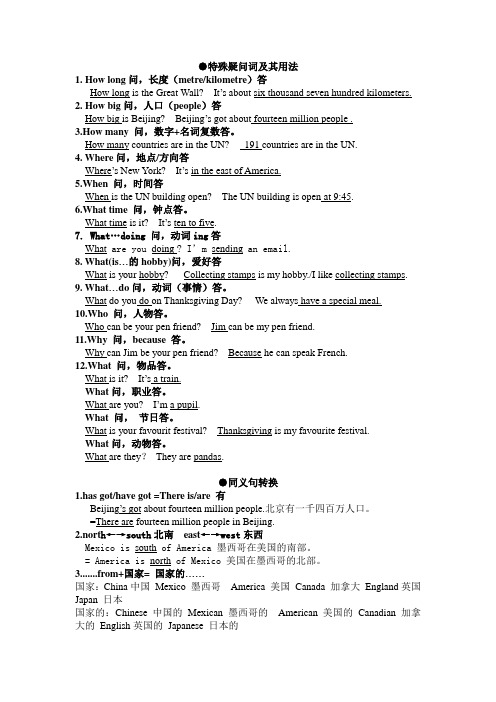
●特殊疑问词及其用法1. How long 问,长度(metre/kilometre)答How long is the Great Wall? It’s about six thousand seven hundred kilometers.2. How big 问,人口(people)答How big is Beijing? Beijing’s got about fourteen million people .3.How many 问,数字+名词复数答。
How many countries are in the UN? 191 countries are in the UN.4. Where问,地点/方向答Where’s New York? It’s in the east of America.5.When 问,时间答When is the UN building open? The UN building is open at 9:45.6.What time 问,钟点答。
What time is it? It’s ten to five.7. What…doing 问,动词ing答What are you doing ? I’m sending an email.8. What(is…的hobby)问,爱好答What is your hobby? Collecting stamps is my hobby./I like collecting stamps. 9. What…do问,动词(事情)答。
What do you do on Thanksgiving Day? We always have a special meal.10.Who 问,人物答。
Who can be your pen friend? Jim can be my pen friend.11.Why 问,because 答。
小学英语六年级上册1-6单元知识点总结
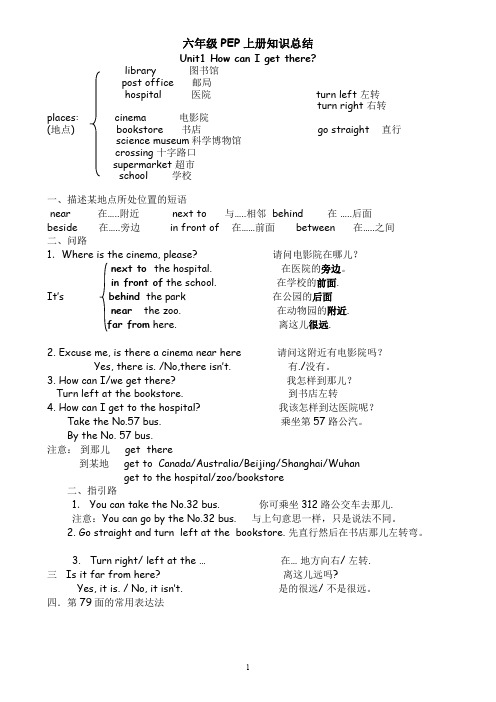
六年级PEP上册知识总结Unit1How can I get there?library图书馆post office邮局hospital医院turn left左转turn right右转places:cinema电影院(地点)bookstore书店go straight直行science museum科学博物馆crossing十字路口supermarket超市school学校一、描述某地点所处位置的短语near在…..附近next to与…..相邻behind在…..后面beside在…..旁边in front of在……前面between在…..之间二、问路1.Where is the cinema,please?请问电影院在哪儿?next to the hospital.在医院的旁边。
in front of the school.在学校的前面.It’s behind the park在公园的后面near the zoo.在动物园的附近.far from here.离这儿很远.2.Excuse me,is there a cinema near here请问这附近有电影院吗?Yes,there is./No,there isn’t.有./没有。
3.How can I/we get there?我怎样到那儿?Turn left at the bookstore.到书店左转4.How can I get to the hospital?我该怎样到达医院呢?Take the No.57bus.乘坐第57路公汽。
By the No.57bus.注意:到那儿get there到某地get to Canada/Australia/Beijing/Shanghai/Wuhanget to the hospital/zoo/bookstore二、指引路1.You can take the No.32bus.你可乘坐312路公交车去那儿.注意:You can go by the No.32bus.与上句意思一样,只是说法不同。
小学英语六年级上册课本知识点(外研版三年级起点)

小学英语六年级上册课本知识点(外研版三年级起点)Module 11、介词of表示“的”,a picture of the Great Wall“一张长城的照片”,a map of the US“一张美国的地图”2、How long“…多长?”提问长度(1)How long is the Great Wall?(2)回答:It is+数字+kilometres long,如It is twenty thousand kilometers long.3、thousand“千”、million“百万”:(1)英语中没有表示“万”的单词,“万”是ten thousand(2)前加数词不变复数,[正] twenty thousand [误] twenty thousands4、more than“超过”5、tell sb sth about sth:“告诉某人关于某事的情况”eg:Tell me more about the Great Wall.Can you tell me something about New York?6、How big“…多大?”提问大小/人口规模(1)How big is New York?(2)回答:It has got more than eight million people.复习:7、词性变化:real(形)-really(副)8、have got=have、has got=has“有”(1)否定句:在have/has后加not,如I haven’t got a picture of the Great Wall.(2)疑问句:have/has提前,如Have you got a picture of the Great Wall? Yes, I have. No, I haven’t.9、城市/国家名前不加the,如in America,如果是缩写要加the,如in the US普通名词构成的专有名词前加the,如the Great Wall“长城”、the West Lake“西湖”10、a lot of=lots of“许多”,后面可以接可数名词复数,也可以接不可数名词11、短语:、look at“看”、in the east of China“在中国的东部”、every day“每天”Module 21、there be句型:There be+名词+介词短语(表示地点)(1)there be与have的区别①there be表示“某地有某物”,如There is a red pen on the desk.“在桌上有一只红色的钢笔。
小学六年级英语上册知识点归纳Unit3

小学六年级英语上册知识点归纳Unit3小学六年级英语上册知识点归纳Unit3Unit 3 What are you going to do ?一、重点短语:this morning 今天上午 this afternoon 今天下午 this evening 今天晚上next week 下周 tomorrow 明天 tonight 今晚post card 明信片 comic book漫画书 newspaper报纸二、重点句型:1.What are you going to do on the weekend?你周末打算做什么?2.I’m going to visit my grandparents this weekend?这个周末我打算去看望我的外祖父母。
3.Where are you going this afternoon? 你今天下午打算去哪里?4.I’m going to the bookstore.我打算去书店。
5.What are you going to buy?你打算去买什么?6.I’m going to buy a comic book.我打算去买一本漫画书。
三、重点语法:1、What are you going to do?你想做什么?询问他人在未来的打算。
be going to 后面要跟动词的原形。
注意be going to be 意思是"打算成为什么,干什么职业。
"注意一下句子的区别,找出正确回答。
What are you going to do this afternoon?What are you going tobuy?What are you going to be?When? are you going?Where are you going?How are you going?Who are you going with?2、this evening 和tonight的区别:this evening指的是今天晚上睡觉以前的时间,一般指晚上十二点以前。
人教版小学pep英语(三年级起点)六年级上册知识点归纳

Unit1 How can I get there? 我怎样到达这里?重点单词:where哪里 how 怎样 can能够 near近的 ask问 tell 告诉far远的science科学hospital 医院 museum 博物馆 postoffice 邮局library图书馆 bookstore 书店 usually通常sometimes有时候often 经常know知道near旁边 next to旁边(比near更近) crossing 十字路口turn left 向左转 turn right 向右转go straight直走in front of在…的前面 behind在...的后面重点句子:1.How do you go to school? 你是怎样去上学的?2.where is the restaurant? 餐馆在哪里?ually I go to school on foot.我通常走路去上学。
4.Sometimes I go by bike.有时候我骑自行车去。
、5.问路之前,出于礼貌,我们要说“Excuse me.”与后面的句子要用标点符号隔开。
6.Look at the traffic lights, remember the trafficrules.看着交通灯,记住交通规则。
7.Stop at a red light.Wait at a yellow light.Go at agreen light.红灯停。
黄灯等一等。
绿灯行。
8.Red means stop, yellow means wait, green means go.红色的意思是停止,黄色的意思是等待,绿色的意思是通行。
9.How can I get to the park? 我该怎样到达公园呢?10.You can go by the No.15 bus.你可以坐15路公交车去。
重点知识:1.坐某种交通工具用by,例如:by bike, by train。
人教版(PEP)小学英语六年级上册各单元知识点归纳(三年级起点)
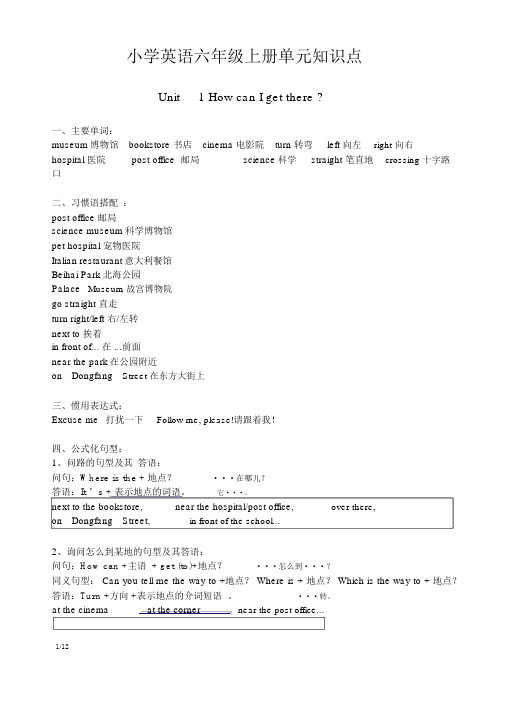
小学英语六年级上册单元知识点Unit 1 How can I get there ?一、主要单词:museum博物馆bookstore 书店cinema 电影院turn 转弯left 向左right 向右hospital 医院post office 邮局science科学straight 笔直地crossing 十字路口二、习惯语搭配:post office 邮局science museum科学博物馆pet hospital 宠物医院Italian restaurant意大利餐馆Beihai Park 北海公园Palace Museum 故宫博物院go straight 直走turn right/left 右/左转next to 挨着in front of... 在 ...前面near the park在公园附近on Dongfang Street 在东方大街上三、惯用表达式:Excuse me打扰一下Follow me, please!请跟着我!四、公式化句型:1、问路的句型及其答语:问句:Where is the + 地点?···在哪儿?答语:It ’s + 表示地点的词语。
它···。
next to the bookstore,near the hospital/post office,over there,on Dongfang Street,in front of the school...2、询问怎么到某地的句型及其答语:问句:How can +主语 + get (to)+地点?···怎么到···?同义句型: Can you tell me the way to +地点? Where is + 地点? Which is the way to + 地点?答语:Turn +方向 +表示地点的介词短语。
六年级上册英语重点句型归纳

六年级上册英语重点句型归纳Unit 11.How do you go to school? 你是怎样去上学的?2.where is the restaurant? 餐馆在哪里?3. Usually I go to school on foot. 我通常走路去上学。
4. Sometimes I go by bike. 有时候我骑自行车去。
5. 问路之前,出于礼貌,我们要说“Excuse me”与后面的句子要用标点符号隔开。
6.Look at the traffic lights, remember the traffic rules.看着交通灯,记住交通规则。
7.Stop at a red light.Wait at a yellow light. Go at a green light. 红灯停。
黄灯等一等。
绿灯行。
8.Red means stop, yellow means wait, green means go.红色的意思是停止,黄色的意思是等待,绿色的意思是通行。
9.How can I get to the park?我该怎样到达公园呢?10.You can go by the No.15 bus. 你可以坐15 路公交车去。
Unit 21.Let's go to the nature park.让我们一起去公园吧!2.——How do we get there?我们怎样到达这里?——By bus 乘公交。
3.The park is over there.公园在那里。
4.Let's go .我们一起出发吧!5.Slow down and stop at a yellow light.黄灯等一等。
6.Stop and wait at a red light.红灯停。
Go at a green light.绿灯行。
Unit 31.---What are you going to do tomorrow?---I'm going to have an art lesson.此句是个一般将来时态的特殊疑问句。
六年级上册英语划线部分提问及语法总复习

六年级上册英语划线部分提问及语法总复习一、小学英语划线部分提问的归纳就划线部分提问,做题有方法:划线部分在问句出现肯定错,特殊疑问词要根据提问的意思来选择。
以下口诀要牢记:1.问“谁”用who; 2.问“谁的”,用whose;3.问“地点哪里”,用where;4.问“原因”,用why;5.问“身体状况”,用how;6.问“方式”,用how;7.问“年龄”,用how old; 8.问“多少”,可数用how many;不可数用how much; 9.问"价钱”用how much;10.问“哪一个”,用which ;11.问“什么”,用what;12.问“职业”,用what;13.问“颜色”,用what colour; 14.问“星期”,用what day;15.问什么学科,用what subject;16.问“什么时候”,用when;17.问几点用What’s the time?或 What time is it?特殊疑问句= “特殊疑问词+一般疑问句”划线部分是“事或物”,特殊疑问词用whatEg: This is a bag. ---What is this?We often play football on Sundays . ---What do you often do on Sundays ? 2划线部分是“人”,特殊疑问词用whoEg:She is my sister. ---Who is she ?划线部分是“地点”,特殊疑问词用whereEg:The apple is on the desk.---Where is the apple ?划线部分是“时间”,特殊疑问词用what time或whenEg:It's six thirty . ---What time is it ?I usually get up at six forty . --- When do you usually get up?划线部分是“年龄”,特殊疑问词用how oldEg:I am twelve . ---How old are you?My mother is thirty- two . ---How old is your mother ?划线部分是“职业”,特殊疑问词用whatEg:Tom is a worker. ---What is Tom?/What does Tom do?划线部分是“颜色”,特殊疑问词用what colourEg:My hat is blue . ---What colour is your hat?划线部分是“数量”,特殊疑问词用how many或how muchEg:I can see five birds in the tree.---How many birds can you see ?There is some tea in the cup. ---How much tea is there in the cup ?划线部分是“多少钱”,特殊疑问词用how muchEg:This book is ten yuan . ---How much is this book ?划线部分是“形容词性物主代词或名词性物主代词”,特殊疑问词用whoseEg:That is my shirt . ---Whose shirt is that ?The pen is yours. ---Whose is the pen ?小学英语对划线部分提问答题口诀:一代(用疑问词代替划线部分),二移(把疑问词移至句首),三找(找is , are ,can,would抄在疑问词后,没有则用do,does(用于主语是第三人称),出现I am 则直接改为Are you),四抄(照抄其它部分)五改(出现some,要考虑是否改为any。
小学英语人教精通版六年级上册重点归纳
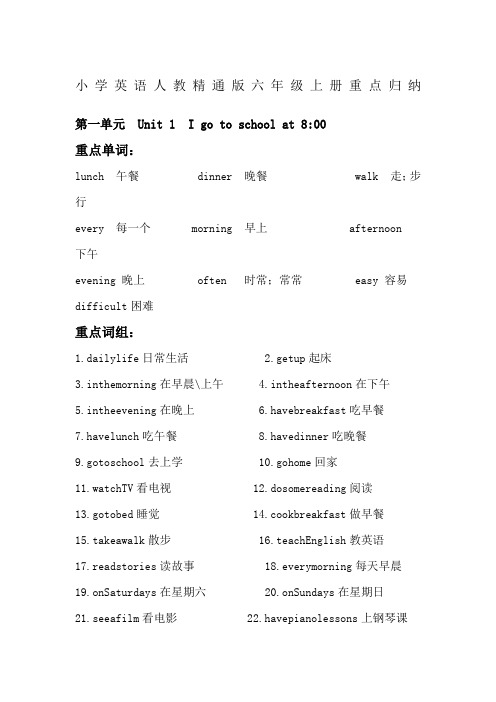
小学英语人教精通版六年级上册重点归纳第一单元 Unit 1 I go to school at 8:00重点单词:lunch 午餐 dinner 晚餐 walk 走;步行every 每一个 morning 早上 afternoon 下午evening 晚上 often 时常;常常 easy 容易difficult困难重点词组:1.dailylife日常生活2.getup起床3.inthemorning在早晨\上午4.intheafternoon在下午5.intheevening在晚上6.havebreakfast吃早餐7.havelunch吃午餐 8.havedinner吃晚餐9.gotoschool去上学 10.gohome回家11.watchTV看电视 12.dosomereading阅读13.gotobed睡觉 14.cookbreakfast做早餐15.takeawalk散步 16.teachEnglish教英语17.readstories读故事 18.everymorning每天早晨19.onSaturdays在星期六 20.onSundays在星期日21.seeafilm看电影 22.havepianolessons上钢琴课23.playthepiano弹钢琴 24.athome在家25.helpsb.todothehousework帮助某人做家务26.cleanthedoor擦门 27.cleanthewindow擦窗户28.cleanthefloor擦地板重点句型:1.Idon’thavebreakfastat7:00inthemorning.我不是在早上七点钟吃早餐;2.Shegetsupat6:00inthemorning.她在早上六点钟起床;3.Shedoesn’tgetupat6:30inthemorning.她不是在早上6:30起床;4.WhatdoesKatedoonSaturdays凯特在周六做什么5.Sheusuallyplaysthepiano.她通常弹钢琴;6.Ihavebreakfastat7:30.我在7:30吃早饭;7.Ihavelunchat12:00.我在12:00吃午饭;8.Ihavedinnerat6:00.我在6:00吃晚餐;9.WhatdoyoudoonSaturdays你在周六干什么10.Ioftengoandseeafilm.我经常去看电影;第二单元 Unit 2 What's your hobby重点单词:open开;打开 hobby爱好 collect收集map地图 box盒子 colour颜色dad爸爸 mum妈妈 plant 植物;种植flower 花 drink喝 tea茶take 拿;取 photo照片 kid小孩baby婴儿 hungry饿的 cry哭重点词组:1.anewtoycar一辆新的玩具汽车2.havealook看一看3.collecttoycars收集玩具汽车4.collectstamps收集邮票5.collectmaps收集地图6.collectpicturecards收集卡片7.lookat看 8.plantflowers种花9.drinkChinesetea喝中国茶 10.gofishing去钓鱼11.cookmeals做饭12.beinterestedin…对……感兴趣13.makedolls做布娃娃 14.playcomputergames玩电脑游戏15.takephotos照相 16.takegoodcareof照顾好17.talkabout谈论 18.playbasketball打篮球19.lookfor寻找20.from…to…从……到……21.atnight在夜间重点句型:1.What’syourgrandpa’shobby你爷爷的爱好是什么2.Hishobbyisfishing.他的爱好是钓鱼;3.Whatareyouinterestedin你对什么感兴趣4.I’minterestedintakingphotos.我对拍照感兴趣;5.What’syourhobby你的爱好是什么6.Myhobbyiscollectingmaps.我的爱好是收集地图;6.What’syourdad’shobby你爸爸的爱好是什么7.Hishobbyisplantingflowers.他的爱好是种花;第三单元 Unit 3 Would you like to come to my birthday party重点单词:jelly果冻 time时间 after 在……后then那时 me 我I的宾格 bye再见kind种类 candy糖果 light点燃ice cream冰激凌 sure当然重点词组:1.birthdayparty生日聚会2.afterschool放学后3.invitationcard邀请卡4.inviteyourfriendstoyourparty邀请朋友参加聚会5.celebrateyourbirthdaywithyourfriends与朋友庆祝生日6.giveabirthdaycardtoyourfriend向朋友赠送生日贺卡7.star-shapedcake星形蛋糕 8.heart-shapedcake心形蛋糕9.fruitpie水果派\水果馅饼 10.lightthecandles点蜡烛11.singthebirthdaysong唱生日歌 12.makeawish许愿13.blowoutthecandles吹蜡烛 14.cutthecake切蛋糕15.eatthecake吃蛋糕 16.apieceofcake一块蛋糕重点句型:1.Whatkindofcakewouldyoulike你想要什么种类的蛋糕2.I’dlikeaheart-shapedcake.我想要一个心形的蛋糕;3.Howdotheycelebratethebirthday他们怎么庆祝生日的4.First,theylightthecandlesandthen首先,他们点燃蜡烛,然后……5.Wouldyouliketocometomybirthdayparty你愿意来我的生日晚会吗6.Sure.I’dloveto. 当然,我愿意;7.Goodbye/Bye-bye/Bye 再见;8.CanIhavesomeicecream我能吃些冰激凌吗9.Here’sabirthdaycakeforyou.这个生日蛋糕是送给你的;10.inviteyourfriendstoyourparty邀请你的朋友到你的晚会11.celebrateyourbirthdaywithyourfriends和你的朋友一起庆祝你的生日12.giveabirthdaycardtoyourfriend把这个生日卡片给你朋友第四单元 Unit 4 January is the first month重点单词:Easter复活节 January一月February二月Back回原处;后面 their他她、它们的 March三月April 四月 tree 树;树木grass草;草地Stop使停止 egg蛋;卵 May五月June 六月重点词组:1.thefirstmonthoftheyear一年里的第一个月2.thesecondmonthoftheyear一年里的第二个月3.NewYear’sDay新年4.SpringFestival春节5.TreePlantingDay植树节borDay\MayDay劳动节7.Mother’sDay母亲节8.Children’sDay儿童节9.Father’sDay父亲节 10.planttrees植树11.thethirdmonthoftheyear一年里的第三个月12.thefourthmonthoftheyear一年里的第四个月13.thefifthmonthoftheyear一年里的第五个月14.thesixthmonthoftheyear一年里的第六个月15.gobackhome回家 16.inthesouthofChina在中国南方17.alltheday一整天 18.inMarch在三月19.takeaphoto照相 20.goonatrip旅行重点句型:1.Januaryisthefirstmonthoftheyear.一月份是一年中的第一个月;2.Februaryisthesecondmonthoftheyear.二月份是一年中的第二个月;3.Marchisthethirdmonthoftheyear.三月份是一年中的第三个月;4.Aprilisthefourthmonthoftheyear.四月份是一年中的第四个月;5.Mayisthefifthmonthoftheyear.五月份是一年中的第五个月;6.Juneisthesixthmonthoftheyear.六月份是一年中的第六个月;第五单元 Unit 5 July is the seventh month重点单词:Christmas圣诞节 July七月 August八月Month月 year 年 September 九月October 十月 November十一月 December十二月重点词组:1.theseventhmonthoftheyear一年里的第七个月2.July1st七月一日3.theCommunistPartyofChina中国共产党4.Partymembers党员5.theeighthmonthoftheyear一年里的第八个月6.AmyDay建军节7.NationalDay国庆节8.Teachers’Day教师节 9.ThanksgivingDay感恩节10.onAugust1st在八月一日 11.inAugust在八月12.summer holidays暑假 13.theparty’sbirthday党的生日14.theninthmonthoftheyear一年里的第九个月15.gobacktoschool回到学校 16.SantaClaus圣诞老人17.thetenthmonthoftheyear一年里的第十个月18.theeleventhmonthoftheyear一年里的第十一个月19.thetwelfthmonthoftheyear一年里的第十二个月重点句型:1.Julyistheseventhmonthoftheyear.七月是一年中的第七个月;2.Augustistheeighthmonthoftheyear.八月是一年中的第八个月;3.Septemberistheninthmonthoftheyear.九月份是一年中的第九个月;4.Octoberisthetenthmonthoftheyear.十月份是一年中的第十个月;5.Novemberistheeleventhmonthoftheyear.十一月份是一年中的第十一个月;6.Decemberisthetwelfthmonthoftheyear.十二月份是一年中的第十二个月;11.Christmas圣诞节21.Decemberisthelast.十二月份是最后一个;22.monthoftheyear一年中的月份第六单元 Unit 6 There are four seasons in a year重点单词:Season季节 spring 春天 little小的Green绿色的 bird 鸟 fly飞Begin开始 close 关;关闭 summer夏天Weather天气 heavy重的 rain雨;下雨Autumn秋天 yellow黄色的 brown棕色的White白色的 winter 冬天 snowman 雪人重点词组:1.alotof许多,大量2.wakeup醒来3.farmtheland耕地4.goonspringoutings去春游5.flykites放风筝6.goonatrip去旅游7.gotoasummercamp去夏令营8.havesummerholidays过暑假9.goswimming去游泳 10.pickapples摘苹果11.cutrice割稻子 12.makeasnowman堆雪人13.sweepthesnow扫雪 14.climbatree爬树15.havefun玩得高兴 16.thinkof思考17.celebrateSpringFestival庆祝春节18.playinthepark在公园里玩 19.gotothezoo去动物园重点句型:1.What’sspringlike春天是什么样的2.Whatdopeopledoinspring人们在春天做什么3.Treeshavenewgreenleaves.树木长着新的绿叶;4.Therearealotofflowersonthepeachtrees.在桃树上有许多花;5.Birdssingtowelcomethespring.鸟儿唱着歌迎接春天的到来;6.Whatdostudentsdoonsummerholidays学生们在暑假做什么7.Whatdopeopledoinautumnandwinter人们在秋天和冬天做什么8.Springisthefirstseason.春天是第一个季节;语法点总结:一、基数词,序数词序数词前一定要加“the”,序数词一般用于:①日期the号序数词of月the 8th of July七月八号②第几…the 15th| fifteenth第十五号③名次the fifteenth第十五名二、动词1.be动词原型am/is/arebe动词过去式was| wereIamwasHe/she/itiswasWe/you/theyarewere三、介词①in+月、年themorning/afternoon/evening/aweek表示时间②on+具体某一天几月几日/某个假期…Day③at+具体某点时间、某个假期…Festival/theweekend①in…street表示方位②on…road/left/right③atthe…crossing/stop/某个具体的地点①inthetree不是树上长出来的,比如:Bird in the tree②onthetree树上原来自己长出来的比如:Apple on the tree表示时间:①ago……以前later……以后②before在……以前after 在……以后四、名词1.不可数名词:bread, juice, tea, coffee, water, chocolate, rice, paper不可数名词相对应的be动词永远都是is/was2、名词复数规则1.一般情况下,直接加-s,如:book-books,bag-bags,cat-cats,bed-beds2.以s.x.sh.ch结尾,加-es,如:bus-buses,box-boxes,brush-brushes,watch-watches3.以“辅音字母+y”结尾,变y为i,再加-es,如:family-families,strawberry-strawberries4.以“f或fe”结尾,变f或fe为v,再加-es,如:knife-knives 5不规则名词复数:man---men,woman---women,policeman---policemen,policewoman---policewomen,mouse---micechild---childrenfoot---feet,.tooth ---teethfish---fish,people---people,Chinese---Chinese,Japan ese---Japanese1.主格一般用在句中作为主语,一般用在动词前除疑问句2.宾格多用于动词介词后面;3.形容词性物主代词后面必须要跟名词;4.名次性物主代词=形容词性物主代词+名词六、形容词及副词的比较级1.形容词比较级用于两者比较,基本句式为:A主格+be|+形容词比较级+than+B宾格;2.副词比较级基本句式为:A主格+动词|+副词比较级+than+B宾格;3.比较级的用法:①一般+er②双写最后一个字母+er,如thin—thinner,big—bigger,fat—fatter,hot—hotter,③不规则的比较级:good/well—better,many/much—more,far—farther/further4.一样的情况用as…as,句式为:as原级as5.注意:too,very+原级七、动词时态:一般现在时Be型:I用am,you用are,is连着他她它;单数is,复数are.变否定,很简单,be动词后加not,变疑问,更容易,动词往句首提.一二人称要互换,句末问号莫丢弃,否定疑问任你变,句首大写莫忘记.Do型:一般现在时很简单,主语总是加动原;除非主语是三单,三单动词有变化;变否定,找动词,动原前面加don’t;动词三单加doesn’t,后面动词改原形;变疑问,找动词,动原句首加上do;如果动词是三单,助动词does句首请;主语紧随在其后,动词改原形莫迟疑.动词第三人称单数变化:①be的第一人称单数形式为am,第三人称单数形式为is,其他人称形式为are.②have的三人称单数为has.③一般动词三人称单数形式是在动词原形后加s或es.加-es的动词规则注意:名词变复数也是加s或es:①在动词后加s②以s、x、ch、sh结尾的词,若发咝音就加es③以”辅音+o”结尾的词要加”es”,如goes,does,potatoes;以”元音+o”结尾的词,直接加s.④部分以f或fe结尾的名词变复数时要将f变v再加”es”,如knifeknives,wifewives一般过去时:主语+动词过去式+表过去的时间Whatdid+do+过去时间Did+主语+动词原形+过去时间动词过去式变化规则:规则变化:①一般在动词原形末尾加ed②词尾e的动词加d③末尾只有一个辅音字母的重读闭音节,先双写这个辅音字母,再加ed④结尾是“辅音字母+y”的动词变y为I,再加ed,如studied.结尾是”元音+y”的动词直接加ed,如played.动词过去式+ed的读音:①在浊辅音和元音后/d/②在清辅音后面/t/③在/t//d/的音后面发/id/一些不规则动词的变化:am,iswas;arewere;have,hashad;gowent;eatatebuybought;dodid;s kiskied;makemadeseesawleavelefttaketookstudystudiedswimswam singsang一般过去时态如何将肯定句变成一般疑问句①一种是有be动词的,即有was或were,只要把was或were提到句首,把句中第一人称转为第二人称,即I,we变you,my和our变your,然后把句中剩下的单词依次抄下来.如:Itwasawindyday.--WasitawindydayThatwasmybag.---Wasthatyourbag②另一种是无be动词的句子,需要助动词来帮忙;把过去时态的助动词did放在句首,把第一人称改为第二人称,然后把剩下的句子依次抄下来,在抄的过程中,要把动词的过去时转变成原形;如Iwentfishingyesterday.---Didyougofishingyesterday例题:按要求改写下列句子John washedtheclotheslastweekend. WhatdidJohndolastweekend对划线部分提问Jo hndidn’twashtheclotheslastweekend.否定句DidJohnwashtheclotheslastweekend一般疑问句Yes,hedid.肯定回答No,hedidn’t.否定回答一般将来时:①主语+begoingto+动词原形或地点+表将来的时间②shall,will表将来的句子例句:Youwilllikeit.你将会喜欢它;I’mgoingtobeanEnglishteacher.我想成为一名英语老师例题练习:Iamgoingtovisitmygrandparentsthisweekend.对划线部分提问:Whenareyougoingtovisityourgrandparents否定句:Iamnotgoingtovisitmygrandparentsthisweekend.一般疑问句:Areyougoingtovisityourgrandparentsthisweekend肯定回答:Yes,Iam.否定回答:No,Iamnot.一般现在进行时:指在某个时刻正在进行某个动作或从事某项活动句式:主语+be+动词现在分词例题练习:I’mdrawingpictureswithmyfriend.对划线部分提问Whatareyoudoingwithyourfriend否定句:I’mnotdrawingpictureswithmyfriend.一般疑问句Areyoudrawingpictureswithyourfriend肯定回答:Yes,Iam.否定回答:No,Iamnot.特殊疑问词:what什么where哪里who谁whose谁的when什么时候how怎样which 哪一个why 为什么whatcolor什么颜色whatday星期几 whatdate日期whatclass什么 whattime什么时候 whatsubject什么科目howmany多少 what season什么季节 what animal什么动物howlong多长时间howmuch多少钱 howoften多经常howheavy多重 howold多大 howtall多高。
人教版小学六年级英语(上册)知识归纳
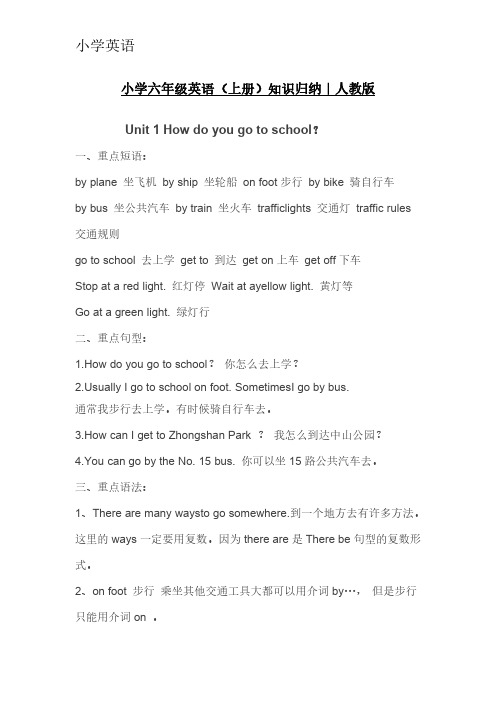
小学六年级英语(上册)知识归纳|人教版Unit1How do you go to school?一、重点短语:by plane坐飞机by ship坐轮船on foot步行by bike骑自行车by bus坐公共汽车by train坐火车trafficlights交通灯traffic rules交通规则go to school去上学get to到达get on上车get off下车Stop at a red light.红灯停Wait at ayellow light.黄灯等Go at a green light.绿灯行二、重点句型:1.How do you go to school?你怎么去上学?ually I go to school on foot.SometimesI go by bus.通常我步行去上学。
有时候骑自行车去。
3.How can I get to Zhongshan Park?我怎么到达中山公园?4.You can go by the No.15bus.你可以坐15路公共汽车去。
三、重点语法:1、There are many waysto go somewhere.到一个地方去有许多方法。
这里的ways一定要用复数。
因为there are是There be句型的复数形式。
2、on foot步行乘坐其他交通工具大都可以用介词by…,但是步行只能用介词on。
4、go to school的前面绝对不能加the,这里是固定搭配。
5、USA和US都是美国的意思。
另外America也是美国的意思。
6、go to the park前面一定要加the.如果要去的地方有具体的名字,就不能再加the,如果要去的地方没有具体名字,都要在前面加the.(go to school除外。
)7、How do you go to…?你怎样到达某个地方?如果要问的是第三人称单数,则要用:How does he/she…go to…?8、反义词:get on(上车)---get off(下车)near(近的)—far(远的)fast(快的)—slow(慢的)because(因为)—why(为什么)same(相同的)—different(不同的)9、近义词:see you---goodbye sure---certainly---ofcourse10、频度副词:always总是,一直usually通常often经常sometimes有时候never从来不Unit2Where is the science museum?一、重点短语:library图书馆post office邮局hospital医院cinema电影院bookstore书店science museum科学博物馆turnleft向左转turn right向右转go straight直行north北south南east东west西next to靠近、与……。
【期末复习】知识梳理+巩固练习六年级英语上册 Unit 3 人教精通版(三起)含答案

六年级英语上册期末总复习Unit 3 Would you like to come to mybirthday party?重点单词:1.time时间2.after在……后3.then 那时4.me 我(I的宾格)5.bye再见6.jelly果冻7.candy糖果8.kind种类9.sure当然10.light点燃11.chocolate巧克力12.ice cream冰激凌13..here在这里14.for给; 为了重点短语:1.star-shaped cake星形蛋糕2.heart-shaped cake心形蛋糕3.fruit pie 水果派;水果馅饼4.light the candles点蜡烛5..sing the birthday song唱生日歌6.make a wish许愿7.blow out the candles吹蜡烛8.cut the cake切蛋糕9.eat the cake吃蛋糕10.my birthday我的生日11.birthday party生日聚会12.chocolate cake巧克力蛋糕13.Teddy bear泰迪熊14.new story book新的故事书15.birthday song 生日歌16.a piece of cake一块蛋糕17.invite your friends to your party邀请朋友参加聚会18.celebrate your birthday with your friends与朋友庆祝生日______19.give a birthday card to your friend向朋友赠送生日贺卡重点句型:1.—你们想要来参加我的生日聚会吗? — 是的。
我很愿意参加。
— Would you like to come to my birthday party?— Sure.I’d love to .2.—你想吃一个蛋糕吗?— 不, 谢谢。
小学人教版六年级英语上册复习要点

小学人教版六年级英语上(Shang)册复习要点Unit1 How can I get there?一(Yi)、重点单词:地(Di)点:science museum科学(Xue)博物馆 post office 邮局 bookstore 书店cinema 电影院 hospital 医院动(Dong)作:go straight 直(Zhi)走 turn left/right 左转、右转方(Fang)位: in front of :在(Zai)···前面 behind 在···后面near在…旁边 next to 紧挨着 beside 在旁边over 在…上方 on the left 在左边 on the right 在右边二、重点句型:(1)Is / Are there…?某处有某物吗?肯定回答:Yes, there is/are. 否定回答:No, there isn’t/aren’t.(2)Where is the + 地点? ... ... 在哪里?It’s + 表示地点的名词. 它... ...例句:Where is the cinema? 电影院在哪?It’s next to the bookstore. 在书店的旁边。
(3)How can + 主语+get(to)+ 地点? ... ...怎么到... ...?(如果get后面接的词为副词,则要省略介词to.)例句:How can we get to the park?How can we get there? 我们怎么到那儿?同义句型:Can you tell me the way to + 地点?( 4 )Where is + 地点? Which is the way to + 地点?( 5 ) Turn left at the bookstore. 到书店左转。
Unit 2 Ways to go to school?一、重点单词/短语:交通方式:by bike /bus /plane /subway /train /ship /taxi /ferry骑自行车/乘公共汽车/飞机/地铁/火车/船/出租汽车/轮渡take the No.57 bus 乘57路公共汽车on foot 步行其他:slow down慢下来 pay attention to 注意 traffic lights 交通信号灯 look right 向右看 cross the road 横穿马路 at home 在家二、重点句型:(1)How do you + 地点?你们怎么来... 的?I usually/ often/sometimes .. ... 我通常/经常/有时...How do you go(to) + 地点?你们怎么去...的?How do you get (to) + 地点?你们怎(Zen)么到达...的?(频度副词:频度副词又称频率副词,用来表示事情发(Fa)生的频率,即某事多主语 + must + 动词原(Yuan)形 + (其它)(must和(He)can, should一样都是情态动(Dong)词,must意(Yi)思是“必(Bi)须”,语气很强烈,没有人称和数的变化,后面接动词原形。
人教版小学六年级上册英语知识点总结归纳
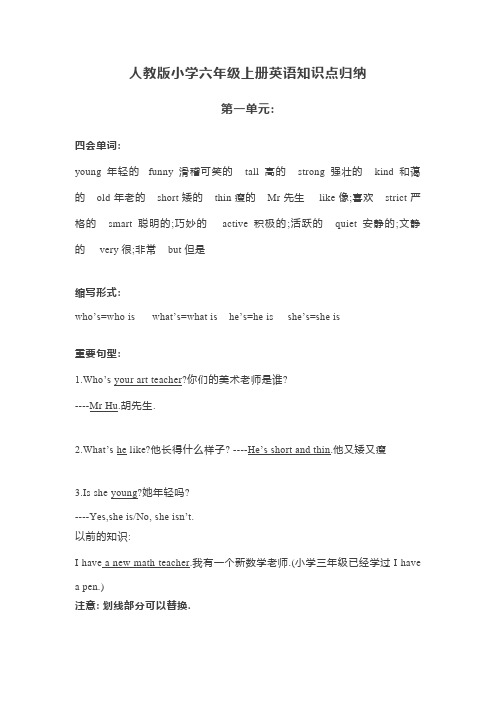
人教版小学六年级上册英语知识点归纳第一单元:四会单词:young年轻的funny滑稽可笑的tall高的strong强壮的kind和蔼的old年老的short矮的thin瘦的Mr先生like像;喜欢strict严格的smart聪明的;巧妙的active积极的;活跃的quiet安静的;文静的very很;非常but但是缩写形式:who’s=who is what’s=what is he’s=he is she’s=she is重要句型:1.Who’s your art teacher?你们的美术老师是谁?----Mr Hu.胡先生.2.What’s he like?他长得什么样子? ----He’s short and thin.他又矮又瘦3.Is she young?她年轻吗?----Yes,she is/No, she isn’t.以前的知识:I have a new math teacher.我有一个新数学老师.(小学三年级已经学过I havea pen.)注意: 划线部分可以替换.第二单元:四会单词:Monday 星期一 Tuesday星期二Wednesday星期三 Thursday星期四Friday 星期五Saturday星期六 Sunday 星期日day天;日子have有;吃on 在……时候too也;太短语:do homework 做作业watch TV 看电视read books 读书What about? ......怎么样?do housework 做家务play computer games 玩电脑游戏重点句型:1.What day is it today?今天星期几?—It’s Monday.星期一.2. What do we have on Mondays?星期一我们有什么课?—We have English,science,computer and P.E.我们有英语课,科学,计算机跟体育课.3.What do you do on Saturdays?星期六你干什么?(具体的某一天前用介词on,在具体的时间前,用介词at)—I often do my homework.我通常做家庭作业.4.What about you?你呢?—I do my homework,too.我也是做家庭作业.第三单元:四会单词:eggplant 茄子fish 鱼green beans 青豆tofu 豆腐potato 土豆tomato 西红柿for 为;给lunch 中餐;午饭we 我们tasty 好吃的;可口的sweet 甜的sour 酸的fresh 新鲜的salty 咸的favourite 最喜爱的;特别喜爱的fruit 水果grape 葡萄缩写形式:they’re=they are don’t=do not重点句型:1.What would you like for lunch?你午餐想吃什么?-----I’d like some tomatoes and mutton.我想吃一些西红柿跟羊肉.2.What’s your favourite fruit?你最喜欢的水果是什么?------/I like apples.我喜欢苹果.3.I don’t like grapes.我不喜欢葡萄.4.Bananas are my favourite.我最喜欢香蕉.第四单元一. 单词:empty the trash倒垃圾cook the meals 做饭water the flowers浇花sweep the floor扫地clean the bedroom打扫卧室make the bed铺床set the table摆餐具wash the clothes洗衣服do the dishes洗碗碟put away the clothes收拾衣服can’t = cannot(不会;不能)use a computer(使用计算机)二. 句子:1. I’m helpful!I can sweep the floor。
人教版(PEP)小学英语六年级上册各单元知识点归纳(三年级起点)
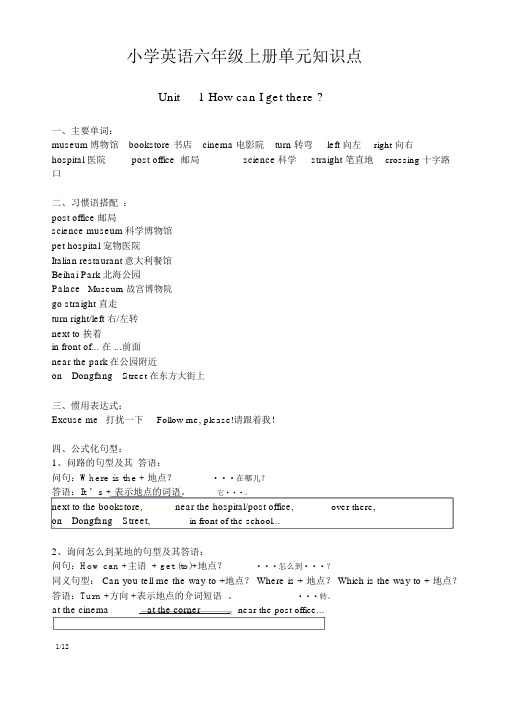
小学英语六年级上册单元知识点Unit 1 How can I get there ?一、主要单词:museum博物馆bookstore 书店cinema 电影院turn 转弯left 向左right 向右hospital 医院post office 邮局science科学straight 笔直地crossing 十字路口二、习惯语搭配:post office 邮局science museum科学博物馆pet hospital 宠物医院Italian restaurant意大利餐馆Beihai Park 北海公园Palace Museum 故宫博物院go straight 直走turn right/left 右/左转next to 挨着in front of... 在 ...前面near the park在公园附近on Dongfang Street 在东方大街上三、惯用表达式:Excuse me打扰一下Follow me, please!请跟着我!四、公式化句型:1、问路的句型及其答语:问句:Where is the + 地点?···在哪儿?答语:It ’s + 表示地点的词语。
它···。
next to the bookstore,near the hospital/post office,over there,on Dongfang Street,in front of the school...2、询问怎么到某地的句型及其答语:问句:How can +主语 + get (to)+地点?···怎么到···?同义句型: Can you tell me the way to +地点? Where is + 地点? Which is the way to + 地点?答语:Turn +方向 +表示地点的介词短语。
- 1、下载文档前请自行甄别文档内容的完整性,平台不提供额外的编辑、内容补充、找答案等附加服务。
- 2、"仅部分预览"的文档,不可在线预览部分如存在完整性等问题,可反馈申请退款(可完整预览的文档不适用该条件!)。
- 3、如文档侵犯您的权益,请联系客服反馈,我们会尽快为您处理(人工客服工作时间:9:00-18:30)。
六年级英语复习资料(二)回答问题
1.Were you at home yesterday?
2. Was your father very busy last night?
3.Were your parents free last weekend?
4.Were you quiet when you were a little child?
5.Did you watch TV last night?
6.Did your friends play football last Sunday?
7.How did you go to school yesterday?
8.How many pupils are there in your class?
9.When and where were you born?
10. How often do you brush your teeth?
11.What did you do yesterday?
12. Do you like travelling?
13.What did you have for lunch yesterday?
14.Is your mother a beautiful lady?
15. When did you become a primary school student?
16.What time did you have lunch yesterday?
17. How many hours should we sleep each night?
18. Where do you live now?
19. Does your father do housework in the evening?
20. Is everything in Guangzhou cheap or expensive?
21. Will you go travelling with your parents on holidays?
22. What do you think of Guangzhou?
23. Are there any cinemas near your home?
24. Was there a library near your home last year?
25. Were there any trees in your village when you were young?
26. What did you like doing when you were a child?
27. What’s your favourite festival? Why?
28. Is Spring Festival the most important festival in China?
29. What do people do during Spring Festival?
30. What is the most important festival in China?
31.What do people usually eat at Mid-autumn Festival?
32. What do people give to the children during Spring Festival?
33. What is the most important festival in western countries?
34. Is Guangzhou a modern city?
35.What festivals do you know?
36.How long does it take you to do your homework every day?
37.Would you like to play games with me now?
38. When is Christmas?
39. When is Spring Festival?。
